
Pareh, released internationally as Pareh, Song of the Rice, is a 1936 film from the Dutch East Indies. Directed by the Dutchmen Albert Balink and Mannus Franken, it featured an amateur native cast and starred Raden Mochtar and Soekarsih. The story follows the forbidden love between a fisherman and a farmer's daughter.
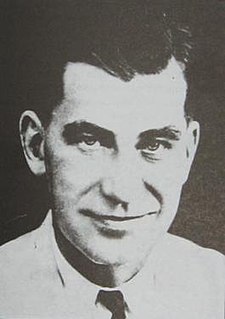
Mannus Franken was a Dutch filmmaker who played an important role in the development of Indonesian cinema. He made his debut as a writer before working with Joris Ivens in producing two documentary films. In 1934 he was called to the Dutch East Indies by Albert Balink to help with the production of Pareh (1936). Franken stayed in the Indies until before World War II, making newsreels. After the war he returned to the country and continued this work. In 1949 Franken returned to the Netherlands, where he made another film before his death.

Loetoeng Kasaroeng is a 1926 fantasy film from the Dutch East Indies which was directed and produced by L. Heuveldorp. An adaptation of the Sundanese folktale Lutung Kasarung, the film tells of a young girl who falls in love with a magical lutung and stars the children of noblemen. Details on its performance are unavailable, although it is known to have been of poor technical quality and thought to have performed poorly. It was the first film produced in the country and the first to feature a native-Indonesian cast. It is likely a lost film.
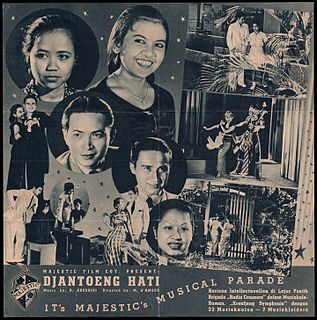
Djantoeng Hati is a 1941 film from the Dutch East Indies directed by Njoo Cheong Seng. A tragedy warning against modernity, it starred A Sarosa, Rr Anggraini, and Ariati
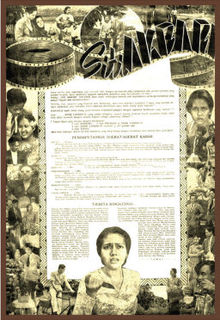
Siti Akbari is a 1940 film from the Dutch East Indies directed by Joshua and Othniel Wong and produced by Tan Khoen Yauw. Starring Roekiah and Rd Mochtar, it follows a couple while the husband commits adultery.

Indonesia Malaise is a 1931 film directed by the Wong brothers. It was the brothers' first sound film and one of the first such films in the Dutch East Indies. Billed as a comedy, the story follows a woman who is overcome by tragedy in her personal life. A commercial failure, it may be lost.
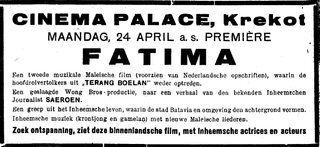
Fatima is a 1938 film from the Dutch East Indies directed by Othniel and Joshua Wong. Written by Saeroen, it starred Roekiah, Rd Mochtar, and ET Effendi and followed two lovers who are disturbed by a rich youth. The film followed the same formula as the earlier hit Terang Boelan, and saw commercial success domestically. It is one of three films which Misbach Yusa Biran credits with reviving the domestic film industry, which had been faltering.
De Stem des Bloeds, also known as Njai Siti, is a 1930 film from the Dutch East Indies. It was directed by Ph. Carli and starred Annie Krohn, Sylvain Boekebinder, Vally Lank, and Jan Kruyt. The film follows a man and his mistress who reunite after their son and step-daughter unwittingly fall in love. The black-and-white film, which may now be lost, was tinted different colours for certain scenes. It was released in early 1930 to commercial success, although critical opinion was mixed.
Ph. G. "Flip" Carli (1879–1972) was a footballer turned film director from the Dutch East Indies.

Huwen op Bevel is a 1931 romance film from the Dutch East Indies. Directed by G. Krugers and thought to have been produced by Tan's Film, it follows two young lovers who are nearly separated but can ultimately be together. A critical flop, it was Krugers's last as a director. It is likely lost.

Gagak Item is a 1939 bandit film from the Dutch East Indies directed by Joshua and Othniel Wong for Tan's Film. Starring Rd Mochtar, Roekiah, and Eddy T. Effendi, it follows a masked man known only as "Gagak Item". The black-and-white film, which featured the cast and crew from the 1937 hit Terang Boelan, was a commercial success and received positive reviews upon release. It is likely lost.

Zoebaida is a 1940 film from the Dutch East Indies directed by Njoo Cheong Seng. A romance set in Timor, it starred Njoo's wife Fifi Young and was the film debut of Soerip. Shot over a period of 27 days in a Dutch-owned studio, the film received middling reviews. It is likely lost.

Ikan Doejoeng is a 1941 film from the Dutch East Indies directed by Lie Tek Swie and starring Asmanah and Soerjono. Following star-crossed lovers, the film was the first released by Standard Film. Likely targeted at the educated elite, it is now probably lost.
Sorga Palsoe is a 1941 film from the Dutch East Indies which was directed by Tan Tjoei Hock for Java Industrial Film. The tragedy, starring Lo Tjin Nio, Tong Hui, Lim Poen Tjiaw, and Rohana, was a commercial failure. It is likely lost.
Djaoeh Dimata is a 1948 film from what is now Indonesia written and directed by Andjar Asmara for the South Pacific Film Corporation (SPFC). Starring Ratna Asmara and Ali Joego, it follows a woman who moves to Jakarta to find work after her husband is blinded in an accident. SPFC's first production, Djaoeh Dimata took two to three months to film and cost almost 130,000 gulden.

Bajar dengan Djiwa is a believed lost 1941 film from the Dutch East Indies. Directed by R Hu and produced by Ang Hock Liem, it starred A Bakar, Djoewariah, O Parma, Oedjang, RS Fatimah, Soelastri, and Zonder. The story centers on two families torn apart by finances and clashes of personality.

Melati van Agam is a 1940 romance film directed by Tan Tjoei Hock and produced by The Teng Chun. Starring S. Soekarti and A.B. Rachman, the film follows young lovers named Norma and Idrus. The film may be lost.

Lintah Darat is a 1941 film from the Dutch East Indies directed by Wu Tsun and produced by Jo Eng Sek.
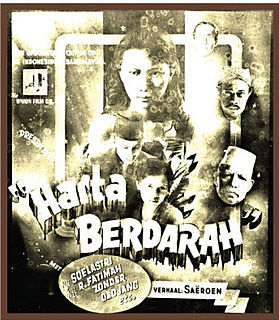
Harta Berdarah is a 1940 action film from the Dutch East Indies. Directed by Rd Ariffien and R Hu for Union Films, the film was written by Saeroen. The film, which stars Zonder and Soelastri, tells of a young man who convinces a stingy hadji to be more charitable and, in the process, falls in love with the man's daughter.

Soeara Berbisa is a 1941 film from the Dutch East Indies. Produced by Ang Hock Liem for Union Films and directed by R Hu, this black-and-white film stars Raden Soekarno, Ratna Djoewita, Oedjang, and Soehaena. The story, written by Djojopranoto, follows two young men who compete for the affections of a woman before learning that they are long-lost brothers.
















